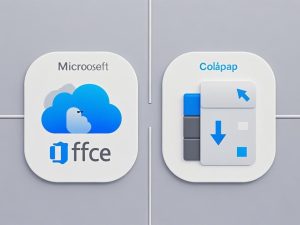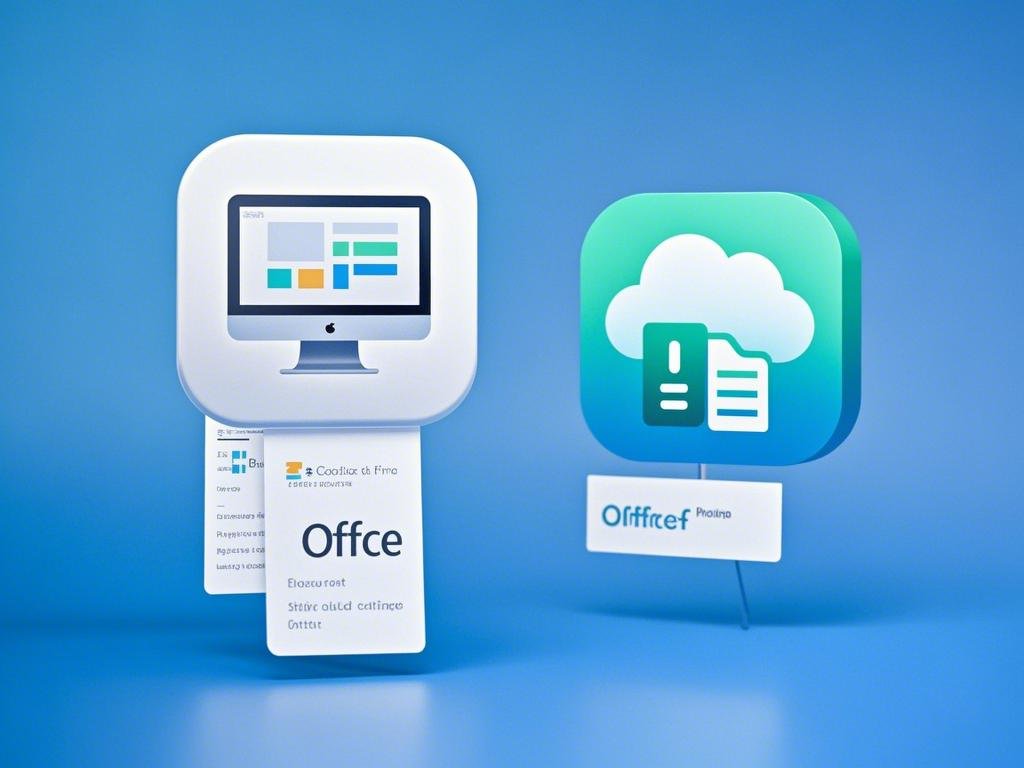Introduzione
Quando si tratta di Ufficio Microsoft, users today have two primary options: the traditional desktop-based version and the more modern cloud-based version through Microsoft 365. Each offers distinct benefits, but which one is right for you? Whether you’re a business professional, student, or casual user, choosing the right version can have a significant impact on your productivity, cost-effectiveness, and workflow.
In this guide, we’ll compare cloud-based E desktop-based Microsoft Office suites, diving into their respective pros and cons. We’ll also explore the key factors that should influence your decision, including cost, accessibility, collaboration, and functionality.

1. What is Desktop Microsoft Office?
Desktop versions of Microsoft Office are installed directly on your computer, and they run independently of the internet. The desktop versions, such as Ufficio 2019 O Ufficio 2021, allow you to work without needing an active internet connection.
Pros of Desktop Microsoft Office:
- Acquisto una tantum: Unlike the subscription model of Microsoft 365, you only pay once for the Office suite.
- Accesso offline: You can use Office apps such as Parola, Eccellere, E Presa della corrente without an internet connection.
- Complete Set of Features: Desktop versions often include all the advanced features, especially for applications like Eccellere E Presa della corrente, without relying on internet speed or cloud access.
- Sicurezza: Files and documents are stored locally on your computer, giving you more control over security.
Cons of Desktop Microsoft Office:
- Limited to One Device: The software is tied to a specific computer or device. If you need it on multiple devices, you’ll need to purchase additional licenses.
- No Automatic Updates: While you get feature updates from time to time, they aren’t as frequent as in Microsoft 365.
- Limited Collaboration Features: Collaboration, especially real-time, is more difficult without cloud access.
2. What is Cloud-Based Microsoft Office (Microsoft 365)?
Microsoft 365 is a cloud-based version of Office, offering apps like Parola, Eccellere, Presa della corrente, E Veduta, accessible via a subscription. With a Microsoft 365 plan, you can install Office apps on multiple devices, including PCs, Macs, tablets, and smartphones.
Pros of Microsoft 365 (Cloud-Based Office):
- Access Anywhere, Anytime: Since the apps and files are cloud-based, you can access them from any device with an internet connection.
- Collaborative Features: Real-time collaboration is one of the biggest selling points. Multiple users can edit the same document simultaneously, which is invaluable for teams.
- Automatic Updates: With a Microsoft 365 subscription, your software is always up-to-date with the latest features and security patches.
- Archiviazione su cloud: With plans like Un'unità, Microsoft 365 includes cloud storage, meaning your documents are automatically backed up and accessible anywhere.
- Cost-Effective for Multiple Users: Microsoft 365 offers family and business plans that allow you to share the subscription across multiple users and devices.
Cons of Microsoft 365 (Cloud-Based Office):
- Subscription Cost: Microsoft 365 requires a recurring monthly or annual subscription, which can add up over time.
- Requires Internet Access: While you can work offline on some applications, full functionality (especially cloud storage and collaboration features) relies on an internet connection.
- Subscription Complexity: Some users may find the various subscription plans (Personal, Family, Business, Enterprise) overwhelming to navigate.
3. Key Factors to Consider When Choosing Between Cloud and Desktop Versions
Here are the key factors to consider when choosing between the cloud-based E desktop-based versions of Microsoft Office:
a. Cost
- Desktop Office: A one-time purchase, but it can be expensive upfront, especially for businesses or families needing multiple licenses.
- Microsoft 365 (Cloud): A subscription model, which may be more affordable over time for multiple users, especially with the cloud storage and additional features bundled in.
b. Collaboration Needs
- Desktop Office: Limited collaboration. While you can share documents, real-time collaboration is not a built-in feature.
- Microsoft 365 (Cloud): Built-in, robust collaboration tools, such as Team Microsoft, real-time document editing, and seamless sharing across devices.
c. Accessibility
- Desktop Office: Access is limited to the device it is installed on unless you purchase additional licenses.
- Microsoft 365 (Cloud): Accessible from multiple devices, including tablets and smartphones, as long as you have an internet connection.
d. Functionality
- Desktop Office: Full feature set without needing an internet connection. Some advanced functions, especially for Eccellere E Presa della corrente, may only be available in the desktop version.
- Microsoft 365 (Cloud): Offers all essential features, but some advanced tools and offline access may be limited in certain cases.
e. Security
- Desktop Office: Files are stored locally on your device, offering more control over data privacy. However, you are responsible for backing up your data.
- Microsoft 365 (Cloud): Files are stored on Microsoft’s cloud, which comes with robust security and backup features, but may not provide the same level of privacy as storing data locally.
4. Which Version Should You Choose?
- For Personal Use: If you only need Office on one device and want to avoid ongoing costs, the desktop version may be ideal. However, if you need cloud storage, multiple device access, or a collaborative environment, Microsoft 365 is a better choice.
- For Businesses: If you’re a business owner looking to ensure that your employees have access to the latest versions of Office, along with real-time collaboration and cloud storage, Microsoft 365 is the clear winner. It’s cost-effective for teams and offers a range of tools for business needs.
- For Students: Many students benefit from the flexibility and affordability of Microsoft 365, especially for collaboration with classmates and access to Office tools across different devices.
Conclusione
Both desktop-based Microsoft Office E Microsoft 365 have their advantages and limitations. The best version for you depends on your personal or business needs, collaboration requirements, budget, and how often you need to access the software.
- If you prefer working offline, and only need Office on one device, the desktop version might be the right choice for you.
- If you need flexibility, real-time collaboration, and cloud storage, Microsoft 365 is the future-proof option.
Ultimately, the right choice comes down to your workflow, needs, and preferences.







 Nessun prodotto nel carrello.
Nessun prodotto nel carrello.